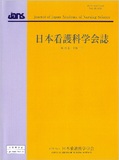Japanese
English
- 販売していません
- Abstract 文献概要
- 参考文献 Reference
要旨
目的:本研究では,実践に比して学術的な関心が当てられてこなかった,病院での明確な意思の確認が困難な終末期高齢者の看取りについて,看護師のEOLC実践における家族支援のプロセスを記述した.
方法:協力が得られた3府県4病院に勤務する看護師19名に高齢患者の看取りの経験について半構造化面接調査を実施し,質的に分析した.
結果:EOLC実践における家族支援のプロセスは,〈病棟の医療チームからEOLCに対する承認や理解を得る〉,〈家族が患者の死(いのちの終わり)を受容できるよう家族の価値観に働きかける〉,〈ケアや看取りに対する家族の評価により家族支援を評価する〉で構成された.
結論:看護師は,病棟内でのコンセンサスのもとでEOLC実践を計画し,治療優先からEOLC実践への転換,展開ができるように家族の価値観に働きかけ,家族と共にEOLC 実践ができるようにしていた.
Purpose: The purpose of this study was to describe the family support process of nurses in End-of-Life Care (EOLC) practice of elderly inpatients who cannot express their intentions clearly, which has not been paid adequate academic attention whereas it amounts to actual practices.
Methods: The study participants were 19 hospital nurses from four hospitals in three prefectures in Japan and data was collected with semi-structured interviews.
Results: The nursing practices for the terminal elderly inpatients involved three phases: (1) obtaining consensus within the ward's medical team regarding EOLC nursing practices, which reinforced the practices, (2) guiding the family in preparing to accept the inpatient's death, and (3) evaluating their nursing practices through the family's reactions after the patient's death.
Conclusion: The practice of EOLC for terminal elderly inpatients in hospitals is to consider the patient's comfort and palliation. Nurses commit their families to be able to accept the inpatient's dying and support them to provide the patients EOLC.
Copyright © 2020, Japan Academy of Nursing Science. All rights reserved.


